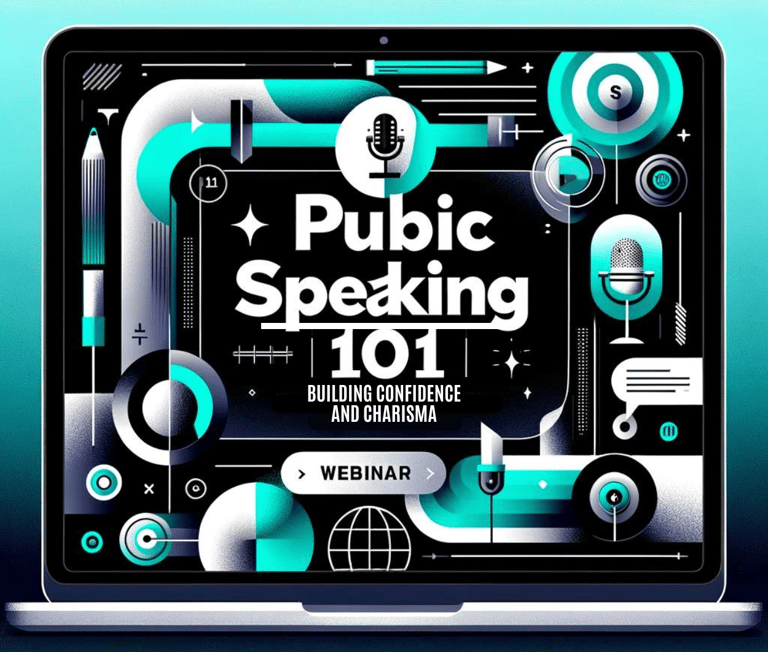Public Speaking 101: Building Confidence and Charisma
Learn the basics of public speaking, including techniques for building confidence and developing charisma. This guide provides practical exercises and tips to help you become a more effective and engaging speaker.
BUSINESSPUBLIC SPEAKINGPERSONAL BRANDINGSIDE GIGCHALLENGESCONFIDENCESIDE HUSTLE
Iolande Argent
7/10/20243 min read


Public speaking can be a daunting task for many, but it's an essential skill that can open doors to numerous opportunities. Whether you're presenting at a conference, pitching to clients, or leading a team meeting, the ability to speak confidently and charismatically can set you apart. In this guide, we’ll explore the basics of public speaking and provide practical exercises and tips to help you build confidence and develop charisma.
1. Understand Your Audience
The first step in becoming an effective speaker is understanding your audience. Knowing who you are speaking to helps tailor your message to their interests, needs, and level of understanding.
Tips:
Research: Gather information about your audience’s demographics, interests, and expectations.
Engage: Ask questions and encourage interaction to make your presentation more relatable.
2. Prepare Thoroughly
Preparation is key to building confidence. The more familiar you are with your material, the more comfortable you'll be when presenting it.
Steps:
Outline: Create a clear outline of your presentation, including the main points you want to cover.
Practice: Rehearse your speech multiple times. Practice in front of a mirror, record yourself, or present to a friend or family member.
3. Develop a Strong Opening
Your opening sets the tone for your entire presentation. A strong, engaging opening captures your audience’s attention and sets the stage for your message.
Techniques:
Start with a Story: Share a relevant personal story or anecdote to make a connection with your audience.
Ask a Question: Pose a thought-provoking question to engage your audience right from the start.
Use a Quote: Begin with a powerful quote that relates to your topic.
4. Build Confidence
Confidence is crucial for public speaking. It not only affects how you feel but also how your audience perceives you.
Exercises:
Power Posing: Practice power poses (e.g., standing with hands on hips) to boost your confidence before speaking.
Visualization: Visualize yourself delivering a successful presentation. Imagine the audience reacting positively to your speech.
Positive Affirmations: Use positive affirmations to build self-confidence. Repeat phrases like “I am a confident and engaging speaker.”
5. Develop Charisma
Charisma can make you more engaging and memorable. It’s the ability to connect with your audience on an emotional level.
Tips:
Be Authentic: Be yourself and let your personality shine through. Authenticity resonates with audiences.
Use Humor: Incorporate appropriate humor to lighten the mood and make your presentation more enjoyable.
Show Enthusiasm: Be passionate about your topic. Enthusiasm is contagious and can captivate your audience.
6. Engage Your Audience
Engagement keeps your audience interested and involved in your presentation.
Techniques:
Eye Contact: Maintain eye contact to create a connection with your audience.
Body Language: Use open and expressive body language to convey confidence and energy.
Interactive Elements: Include interactive elements such as polls, Q&A sessions, or small group discussions.
7. Handle Nerves
It's natural to feel nervous before speaking, but there are ways to manage anxiety and turn it into positive energy.
Tips:
Breathe: Practice deep breathing exercises to calm your nerves.
Focus on the Message: Shift your focus from yourself to the message you want to convey. Remember, it’s about your audience, not you.
Start Small: Begin with smaller, less intimidating speaking opportunities and gradually work your way up to larger audiences.
8. Continuous Improvement
Public speaking is a skill that improves with practice and feedback. Continuously seek opportunities to speak and refine your techniques.
Suggestions:
Join a Speaking Group: Participate in groups like Toastmasters to practice regularly and receive constructive feedback.
Seek Feedback: Ask for feedback from trusted peers or mentors to identify areas for improvement.
Reflect: After each speaking engagement, reflect on what went well and what could be improved.
Final Thoughts
Public speaking is an invaluable skill that can boost your career and personal growth. By understanding your audience, preparing thoroughly, building confidence, and developing charisma, you can become a more effective and engaging speaker. Remember, every great speaker started somewhere, and with practice and persistence, you can master the art of public speaking.
Until next time, keep practicing and speaking with confidence!
Want more tips on public speaking? Join our free webinar on "Public Speaking 101: Building Confidence and Charisma" and take your skills to the next level!


